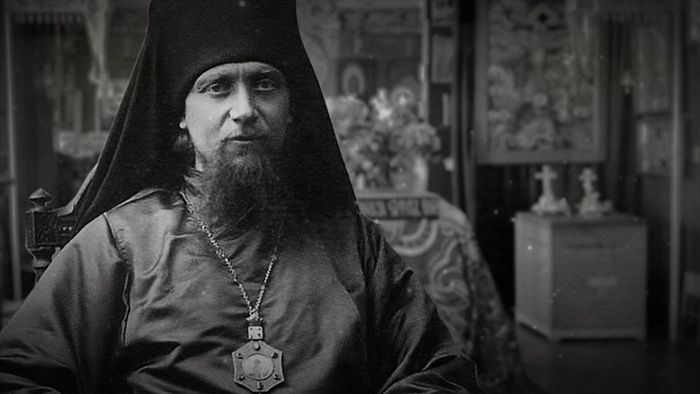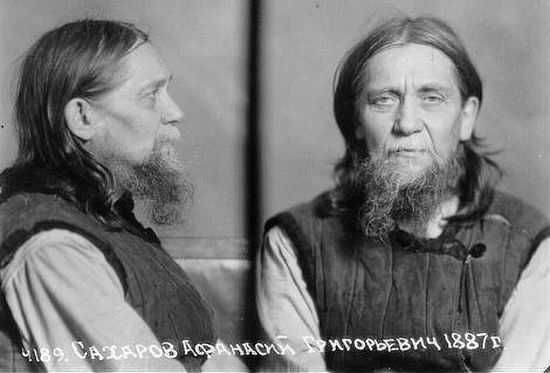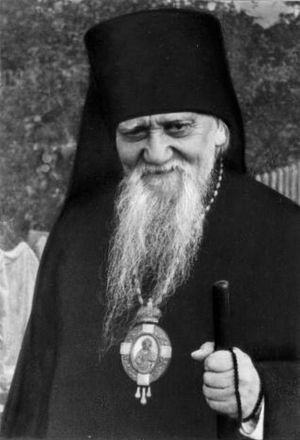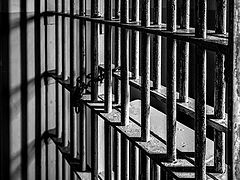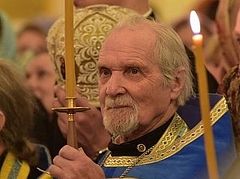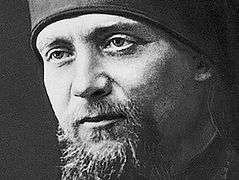On October 15/28, the Church honors the memory of St. Athanasius (Sakharov), bishop and confessor of Kovrov. Theologian, liturgist, and author of Church services, St. Athanasius spent over thirty years of his life in prisons, camps, and exile. He is known to a wide circle of Orthodox Christians as the composer of the service to All the Saints Who Shown Forth in the Russian land. We offer our readers some fragments from the book, Holy Bishop and Confessor Anathasius (Sakharov) (Sretensky Monastery, in Russian).
Bishop Athanasius firmly hoped in God’s Providence. Imprisoned for many years, he wrote to his spiritual children, “My situation is not disastrous. I look at everything calmly, knowing that our service does not depend upon earthly rulers, but upon the One Who holds even the fate of rulers in His hands.”
***
“We must not expect anything from earthly courts and earthly judges. Our courts are with the Lord. If He so wants, He will force a merciless judge to be merciful.”
***
“God’s judgment is not human judgment. If here they grab everything they can get ahold of in order to accuse us, there they will grab (if it is not sinful to say so) everything they can get ahold of in order to justify us. Even one handkerchief soaked with tears lies on God’s judgment scales and will outweigh all our sins, as it was with a certain thief…”
***
“Various sorrows and dire straights redeem our sins. Here we’ll have sorrow, there relief.”
***
The future saint and confessor Bishop Athansius (in the world Sergei Grigorievich Sakharov) was born July 2, 1887, on the feast of the Placing of the Honorable Robe of the Most Holy Theotokos in Blachernae, in the village of Tsarevka, Tambov governate. His father, Gregory, was from Suzdal; he was a farm advisor and a file clerk in the high school, and his mother was a pious, very young, and almost illiterate woman named Matrona, from the peasantry.
***
When his parents were choosing their son’s name, his father wrote down on pieces of paper the names of some of the more venerated saints and gave them to the infant. The newborn grabbed the lot with the name of St. Sergius of Radonezh and was thus named Sergei. Sergei was only two years old when his father died, and he passed his childhood with his mother.
The boy’s childhood and youth were spent in one of the most ancient and beautiful cities of the Russian land, Vladimir—famous for its monasteries and churches. At nine years of age, Sergei entered the Shuya religious school, and at first, just as it was for his patron saint, Sergius of Radonezh in childhood, studies did not come easily to him. In the second grade he had to take the examinations over again because he lagged behind, and he was even retained in the third grade for another year. This greatly burdened the sensitive and responsible child.
***
Sergei easily learned handicrafts; he could sew and embroider even church vestments. This came in very handy to him during his times of exile and prison camp, when he sewed vestments and icon coverings. Once Vladyka even made a special travel antimension, on which he served the Liturgy for prisoners. Preserved to this day is an Epitaphion (Burial Shroud) of the Savior that he embroidered.
Another of Sergei’s interests was poetry, which he himself tried to write. While yet in the religious school he wrote his first liturgical hymn—a troparion to the venerated Shuya-Smolensk icon of the Mother of God. His academic work, “Tuning the believing soul to the Lenten Triodion” testified to the youth’s great knowledge of Church hymnography, which remained one of his mains interests all his life.
***
In 1912, Sergei graduated from the academy as a doctoral candidate in theology and on October 12 he was tonsured a monk with the name Athansius, in honor of St. Anathanasius, Patriarch of Constantinople. The future holy hierarch viewed monasticism with particular reverence and awe. Two days later, Fr. Athansius was ordained a hierodeacon, and three days later, on October 17, a hieromonk.
***
In 1917, he was chosen to be a member of the historical Local Council of the Russian Orthodox Church. In connection with the restoration by the Council of the feast of All Saints Who Shone Forth in the Russian Land, Fr. Athanasius together with the famous historian Boris Alexandrovich Turaev compiled a service for this feast. For almost all the rest of his life until 1955, most of it spent in prisons and camps, he worked on perfecting this service—a hymnographic monument to his love for Holy Russia. And it is no coincidence that the Orthodox Russian people have come to love the spirit-bearing words of this service: “O Holy Russia, preserve the Orthodox faith, for in it is your strength an confirmation.”
***
In 1919, the blasphemous campaign began of opening graves—the atheists defiled monastery necropolises and the relics of saints. When the godless decided to mock the relics of the holy God-pleasers of Vladimir, the clergy of that city, with Fr. Athanasius at the head, foiled their plans. They set a watch in the Dormition Cathedral, and as soon as the blasphemers entered the church, Fr. Athanasius gave the exclamation, “Blessed is our God…” and began serving a moleben to the saints of Vladimir. Those entering began removing their hats, reverently crossing themselves, and placing candles. Thus did the atheists’ intentions turn into a triumph of Orthodoxy.
***
In summer of 1921, Archimandrite Athanasius was consecrated Bishop of Kovrov, a vicariate of the Vladimir diocese. Soon the head of the diocese, Metropolitan Sergius, was sent to Nizhny Novgorod, and the holy hierarch Athanasius became the only bishop in Vladimir.
***
The saint’s first arrest came in March of 1922, placing a beginning to the confessor’s many years of prison and camp trials.
In exile, Bishop Athanasius never sat idly. Others recalled, “You go out of the kitchen into his room, and there is the usual scene: quietude, a lampada burns in the corner, and Vladyka sits at the desk and writes, or pastes icons. This is what for his lively character replaces travels around the diocese!..” It was hard to obtain real icons in exile, and the bishop made them himself; he just as artfully made priest’s crosses out of gold or silver cardboard.
***
Once in Turukhan [Krasnoyarsk region, Siberia] Bishop Athanasius ended up in the local prison. This prison was pure hell. Metropolitan Kirill (Smirnov) of Kazan began praying for him, and following the example of the Kiev elder Parthenius, he read the Gospel for him. Unexpectedly, Bishop Athanasius was freed, and the two hierarchs finished reading the Gospel of John together. Bishop Athanasius remembered his friend to the end of his days, and often talked about him with love.
Later Bishop Athanasius himself advised people in difficult life situations and afflictions to read the Gospel for the sorrowing with prayer. He wrote the words of this prayer down for his spiritual children: “I do not forget your request about sorrowing Olga. I advise one of you to read the Holy Gospel for her, adding this prayer after each chapter: “Save, O Lord, Thy servant (name) through the words of the Divine Gospel, read for the salvation of Thy servant. O Lord, scorch the thorns of all her sins, and may Thy grace come and abide in her, burning, purifying, and sanctifying the whole person, in the name of the Father, the Son, and the Holy Spirit. Amen.” This is what experienced people recommend, and I myself have experienced the power of such reading. Experience it also for yourselves and for others who are in various circumstances…”
***
Bishop Athanasius returned from prison and exile in 1925, and in January 1927 he was again arrested and sent to the Solovki special purpose prison camp.
The bishop passed through many camps. People have related that when returning to the cell, barely alive after interrogations and torture, St. Athanasius said to his co-prisoners, “Let’s pray, let’s praise the Lord!” and was the first to sing, “Praise the name of the Lord!”
***
We can learn about certain circumstances of Vladyka’s time in Turukhan region from his letter: “There is only one torture here—mosquitos, which give one no peace. I can now more or less calmly write only because next to me is what they call a “smoker”, that is, on the earth (I am sitting in the rebuilt foyer) burns a flame, and a rotten log is smoldering and smoking. Without smoke there’s no life here. You can’t go outside without a special mosquito net, and it is even worse in the forest. I put gloves on my hand and they bite right through the gloves. When the foyer wasn’t ready yet, I wrote in my room wearing a mosquito net on my head and gloves on my hands. I kill the mosquitos unmercifully. But true ascetics would intentionally go where there are the most mosquitos; they even took off their clothing and prayed like that. When they finished they would carefully brush the blood-suckers off with a feather so as not to squash them. How can I not be ashamed of my impatience here?”
***
In winter of 1942, Bishop Athanasius was unexpectedly sent by convoy to Moscow. The investigations went on for a half-year. They interrogated him about thirty times, most often at night. Usually the interrogations would last about four hours, but one of them went on for nine whole hours. Vladyka turned out to be a tough nut to crack—a hard one for the chekists break. Three times the interrogator had to request that his interrogation term be lengthened and he be maintained longer under guard because he couldn’t beat the needed confessions out of the bishop. This courageous hierarch and confessor stood his entire life at the service of and guard over the faith. He could not be frightened into submission; all his life he only feared sin.
***
In Siblag [Siberian lager, or camp], where Vladyka was sent in 1943, happened also to be his friend, Fr. Hierax, a monk of the Holy Trinity-St. Sergius Lavra. There are memoirs extant of their meeting. When Fr. Hierax was brought to the camp he went through sanitary inspection, and an armed shooter led him to the barrack. There was anxiety in his soul: What would his neighbors be like? The door opened he could hear the clap of dominoes, foul language and criminal jargon. A pervasive blue tobacco smoke hung thickly in the air. The shooter shoved Fr. Hierax in and showed him a place on the bunks. The door slammed shut. Fr. Hierax stood deafened at the doorway. Someone yelled to him, “Go over there!” Walking over in the appointed direction, he stopped at a totally unexpected sight—on the lower bunk sat Bishop Athanasius. Raising his eyes and catching sight of Fr. Hierax, whom had known for a long time, Vladyka was not surprised in the least, but simply said, “Read! Tone such-and-such, troparion such-and-such!” “Here? Is that possible?” “It’s possible! Read!” And Fr. Hierax began helping Vladyka continue the service he had started, and with this all his anxiety, everything that oppressed his soul just slipped away.
***
The saint wrote, “Our barrack is very dark, and at the fifth hour we can no longer do anything, or even earlier… Thus we have to go through two thirds of the day without light, almost without activity, and most of the time lying down. But not even this is such a great problem, especially since we occupy ourselves part of the nighttime with reading the daily services; although in a very shortened form. Feeling compunction on my bed, I and my neighbor Fr. Hierax try to read the whole cycle of services and commemorate all those who love us and are benefactors. This greatly embellishes our life here.”
While in prison, Vladyka strictly kept the fasts and never stopped reading his prayer rule; and he did not pray alone but also inspired his cellmates to pray. In prisons and camps, no one ever heard a single word of complaint from him. To the contrary, he always gave thanks to God for the opportunity, as he himself said, “to suffer a little for Christ.”
***
In March of 1955, the holy hierarch was finally freed, and he was able to return to his homeland. The holy elder was sixty-eight years old.
Many of the orphaned spiritual children of Archpriest Alexei Mechev, now a canonized saint, and of holy Hieromartyr Sergius Mechev, went to Bishop Athanansius for spiritual guidance. Among Vladyka’s spiritual children was the famous iconographer and restorer Nun Juliania (Maria Nicholaevna Sokolova), who in 1934, at the blessing and from the Bishop Athanasius’s sketch, painted an icon of the Synaxis of All Saints Who Shown Forth in the Russian Land.
***
Vladyka conducted research on Orthodox divine services and the lives of Russian saints, and compiled the thorough work, “On the commemoration of the dead according to the rule of the Orthodox Church”. From 1955 he was the chairman of the commission for divine services and calendar at the Publishing Department of the Moscow Patriarchate, and entered no small amount of corrections into the calendar of saints. He also compiled several moleben rites.
***
Bishop Athanasius’s epistolary heritage is unique in its volume, composition, and number of addressees. Not only during the years of persecution, when it was very risky business to save personal documents, but also during the prerevolutionary period such a large number of letters written by Church figures was rarely preserved. To date there have been over 500 letters by Bishop Athanasius found, carefully preserved in personal archives.
***
The saint wrote to his spiritual children: “And what a great consolation is our faith! We are not despondent in calamities and we are content in sorrows. Separated physically, we are comforted by spiritual, prayerful communion. We do not lose hope that we will meet here, but if this does not happen, then for our the sorrow of our earthly separation the Lord will comfort us with the joy of eternal communion in His mansions on high…”
***
“A believing person begins every work with prayer. There is no doubt that the Lord does not need many words. If an Orthodox Christian crosses himself with faith before every work and says, “O Lord, bless,” the Lord will hear this short prayer and help the one who asks for it in every detail of the work before him.”
***
“For the faithful, sorrows and adversities are a completely different thing. Of course, sorrows are still sorrows, and adversities are still adversities. And the believer is still human. The order of nature is not always overthrown for him, for this may not always be beneficial for him. But for him hope in the Lord, hope in the life of the age to come makes sorrows and adversities half as hard.”
***
Before his death, the elder became very weak and lay in bed. He received Unction and Communion of the Holy Mysteries of Christ. He said of himself, “The cross of old age is sometimes heavy, especially when you feel that you are burdening those around you.”
Just a few days before his death, he suddenly asked his cell attendant, “What day? What hour?” She answered. Vladyka shook his head and pronounced quietly, “Sunday, eight o’clock.” On Sunday, October 28, 1962, at eight fifteen came Bishop Athanasius’s blessed repose. His final words were, “Prayer will save you all!”

